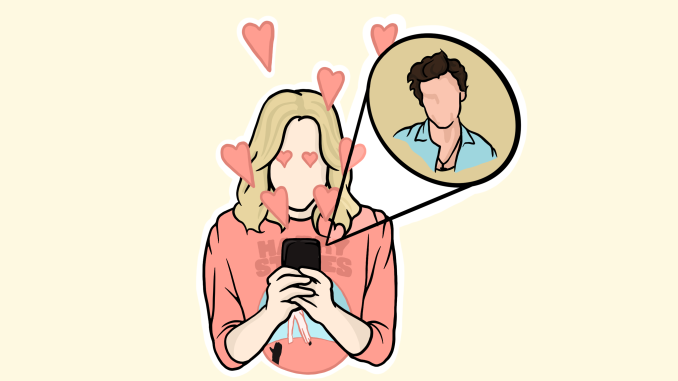
Parasocial relationships are one-sided connections people develop with celebrities they don’t know personally: Think of an Eagles fan with an overly zealous affinity for Jalen Hurts, or a Swiftie who insists the necklace her favorite singer is wearing to dinner is an easter egg clue to the title of her next album.
Amid the rise of social media fueling fan culture, more than half of Americans have been in parasocial relationships, according to a 2022 study by Thriveworks, a mental healthcare company.
Opinion Editor Claire Zeffer, a junior journalism major, Assistant Opinion Editor Valeria Uribe, a sophomore journalism major, and Sophia Reis, a junior communications major, debate the advantages and downfalls of parasocial relationships for college students.
HEALTHY CONNECTIONS
Claire Zeffer, junior journalism major, and Valeria Uribe, sophomore journalism major
Some people may fear that the intense relationships fans share with their favorite celebrities have destructive potential, negatively impacting one’s social life and mental health.
However, parasocial relationships can establish important social ties and improve feelings of isolation and loneliness.
Parasocial relationships can lead to strong real-life social relationships by providing a foundation for students to bond with others, said Dustin Kidd, a sociology professor.
“You are going to college and meeting your roommate, you are meeting folks in your dorms and you share a fandom around a celebrity, around an influencer, and it could be your special thing that bonds you to another person, or a group of people,” Kidd said.
Parasocial relationships also help young people develop a sense of identity because they often find online communities of like-minded individuals with similar interests.
People can feel comfort and companionship through the strong connections they have created with celebrities and other fans because it helps them not to feel alone, Cleveland Clinic reported.
“Even though the initial object of parasocial relationships seems like it’s working against things that are social, it can actually be the foundation for something that has more sociology to it,” Kidd said.
As long as young people are self-aware of the reality of their desires, and don’t cross the line from harmless affection into an unhealthy obsession, these bonds serve as a source of solace and fun.
Chris Bookman, a sophomore criminal justice and political science major, feels connected with his favorite artist Lana Del Rey but also believes his current parasocial relationship with her is likely more meaningful than the one they would share if he knew her in real life.
“She just gets me, I get her,” Bookman said, “My thing with Lana is, I just like her from a distance. I don’t think [the relationship] would be as strong if I knew her personally.”
Parasocial relationships shouldn’t be seen as something inherently bad. Instead, these connections can spark new real-life friendships and counter feelings of isolation.
ROMANTICIZED OBSESSION
Sophia Reis, junior communications major.
Many college-aged adults experience emotional intensity over figures they don’t know. Especially amid the rise of influencers, parasocial relationships negatively affect people’s mental health and promote obsessive behavior.
The relationships distract people from their own lives with unrealistic fantasies, leading to increased anxiety, loneliness and social isolation, Medical News Today reported.
“I am concerned about the one-sided nature of parasocial relationships,” said Sandra Sepulveda-Kozakowski, a psychology professor and clinical psychologist. “It lacks the ability to have a coherent picture of what a relationship looks like in real life.”
When students romanticize their one-sided connections with public figures, they can inhibit the quality of their healthy relationships in real life, as they are more likely to be dissatisfied with their life and romantic relationships, Forbes reported.
“I love Lisa Vanderpump from Real Housewives of Beverly Hills,” said Silvi Franqui-Howey, a sophomore journalism major. “In my head, I’m like, ‘That’s my girl, we’ve got each other.’ I am scared, though, because what if somehow I was given the chance to meet her and we don’t mesh?”
Parasocial relationships give people an unrealistic sense of hope that unrequited connections are mutual, leaving them susceptible to disappointment when things don’t go as they envisioned.
On social media, celebrities and influencers are now sharing more personal content, making potential relationships appear seemingly more plausible.
Many social media figures, like influencer Alix Earle, who has 5.9 million TikTok followers, participate in the “Get Ready With Me” trend, sharing stories with viewers, while doing their hair and makeup and getting dressed, like they’re actual friends. While influencers and celebrities intend to be relatable, they receive free products and invites to luxurious events and trips the average viewer can’t relate to through their content.
This false sense of reality fuels young people’s parasocial relationships because their perceived connection with celebrities and influencers becomes an idealized escapism from their own lives, even though they don’t know the celebrity and likely never will.
“It’s an obscured or fabricated perspective, so I worry about the impact on people’s self-esteem,” Sepulveda-Kozakowski said.
Celebrity obsession is never healthy, and parasocial relationships are easily taken to extremes, harming students’ mental health.
Ben White contributed reporting.


Be the first to comment